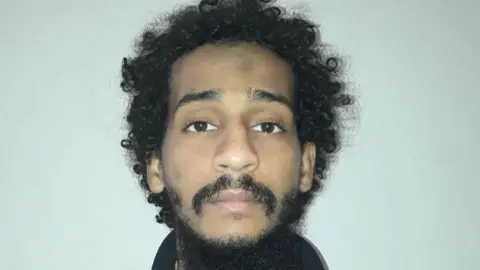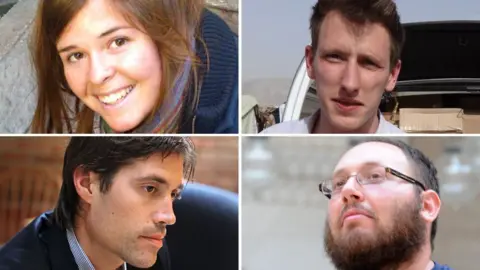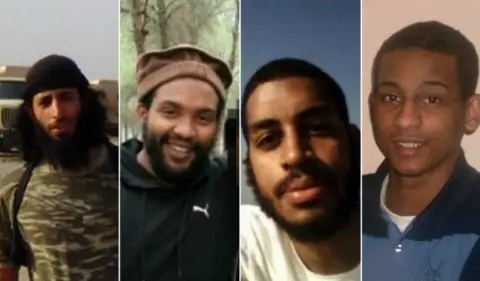El Shafee Elsheikh: Key moments from IS jihadist's US trial
 Reuters
ReutersA US federal court has convicted ex-British jihadist El Shafee Elsheikh on terror charges over his involvement with the Islamic States group militant cell.
The notorious cell is linked to the abduction, torture and beheading of several IS hostages in Syria, including journalists and aid workers.
Jurors on Thursday found Elsheikh, 33, guilty on eight counts of kidnapping and conspiracy to commit murder.
He was the highest profile IS fighter to stand trial in the US.
Hostages nicknamed the Sudanese-born Londoner and two other men the "Beatles" because of their British accents.
The last of the Beatles to face justice, Elsheikh now faces life in prison.
Here is a look at key moments from the 11-day trial in Alexandria, Virginia:
'Fighting for suffering Muslims'
In opening arguments, lawyers for Elsheikh claimed he was not a member of the Beatles and should not be held responsible for what the group did.
They painted him instead as "a simple Isis fighter" who went to Syria alone on behalf of "suffering Muslims".
Pointing out that the group were always fully masked around hostages, the defence said evidence identifying the accused was "inconsistent and unconvincing".
Prosecutors countered that Elsheikh was close friends with the other two and knowingly took part in their abuse of some two dozen people. They added that he was involved in ransom demands from the families of hostages.
 Handout/Boston Globe
Handout/Boston Globe'Begged for their lives'
Marsha Mueller told the court how she and her husband had "begged" for their daughter Kayla's life in email negotiations with her captors.
That included a video plea in which she wore a hijab and addressed then-IS leader Abu Bakr al-Baghdadi. The Sotloffs and Kassigs also recalled making similar video messages.
The Muellers said they were retired and could not "earn in several lifetimes" the €5m (£4.2m; $5.4m) ransom demanded of them. According to Mrs Mueller, the Beatles replied: "get back to work".
As her testimony wrapped, Kayla's boyfriend Omar Alkhani got up from his seat in court, pointed at the defendant and screamed in Arabic that he would go to hell.
'Some sort of cruel joke'
Ed Kassig choked up on the stand reading a "farewell" letter from his son Peter, who wrote that he had taunted death for years but now "never wanted to live more".
"This was a young man knowing his time had come," Mr Kassig said of the 26-year-old aid worker.
Earlier, Diane Foley had recounted that she "didn't want to believe" reports that the hostage takers had beheaded her son James.
"It just seemed too horrific. I was hoping it was some sort of cruel joke," she said.
'Always together and always sadistic'
Former hostages depicted the Beatles as a cohesive unit that revelled in brutality, from handing out random beatings to torturing their prisoners.
Italian aid worker Federico Motka said they were fond of "playing games" with the hostages, like giving them dog names to respond to.
French journalists Nicolas Hénin and Edouard Elias recalled being forced to sing a parody of the Eagles' pop song "Hotel California" retitled "Hotel Osama", with the lyrics "you will never leave / if you try, you will die".
Another Frenchman, Didier François, said the Beatles were "always together and always sadistic".
 UNKNOWN/HO VIA MET POLICE, KOTEY, HANDOUT
UNKNOWN/HO VIA MET POLICE, KOTEY, HANDOUT'Isis aristocracy'
Omer Kuzu, a former IS fighter turned cooperating witness, testified that Elsheikh was clearly "an important person" based upon their interactions in Syria.
While most other fighters wore traditional Afghan clothes and flip-flops, the Beatles wore military uniforms with tactical vests and boots. They were secretive and carried Glock pistols - "a symbol of Isis aristocracy", according to Kuzu.
Witnesses also recalled that the four were extremely careful to hide their identities - donning black balaclavas and gloves, avoiding eye contact, and ordering their captives to face the wall or look down in their presence.
With an almost bemused glance at the defendant, Mr Hénin said: "Maybe they were trying to avoid prosecution."